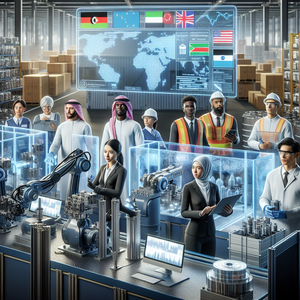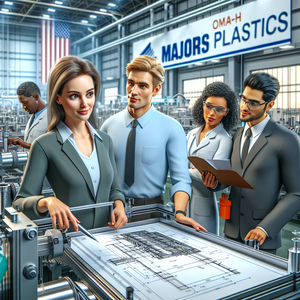
Overcoming Tariff Hurdles: Top Careers in Plastics Manufacturing and the Skills Driving Industry Evolution
The plastics manufacturing industry is undergoing a seismic shift. With global trade policies in flux and tariffs imposed on raw materials such as steel and aluminum as well as finished plastic products, companies are grappling with rising costs, supply chain disruptions, and ever-evolving regulatory landscapes. These challenges demand swift adaptation and innovative problem-solving to remain competitive in an increasingly volatile market.
Job Summaries:
Supply Chain Manager:
- Supply chain managers are pivotal in keeping operations running smoothly in a tariff-driven landscape.
- They identify alternative sourcing strategies, negotiate with domestic suppliers, and optimize inventory to prevent disruptions.
- Their skills include logistics, supplier relations, and global trade regulations, helping companies control costs and maintain efficiency.
Trade Policy Analyst:
- Trade policy analysts evaluate global trade policies, tariffs, and trade agreements to identify risks and opportunities.
- They provide actionable insights on market trends, cost structures, and competitive positioning, enabling businesses to adapt to policy changes and make informed strategic decisions.
Tariff Strategy Consultant:
- Tariff strategy consultants minimize the financial impact of tariffs through strategies like tariff reclassification, reshoring, or diversifying production locations.
- Their expertise in international trade laws and business strategy ensures businesses remain competitive despite increased costs.
Compliance Officer:
- Compliance officers ensure adherence to international trade laws, customs regulations, and tariff classifications.
- They manage audits, maintain documentation, and mitigate risks of non-compliance, helping businesses avoid fines and regulatory issues.
Process Engineer:
- Process engineers optimize manufacturing processes to offset rising production costs triggered by tariffs.
- They focus on improving material usage.
- Increasing machinery efficiency.
- Implementing sustainable solutions.
- Reducing expenses and enhancing productivity.
Market Research Analyst:
- Market research analysts evaluate industry trends, competitor strategies, and customer demand patterns.
- They identify risks and opportunities caused by tariffs, providing insights that allow businesses to adjust strategies and remain competitive.
Logistics Coordinator:
- Logistics coordinators ensure seamless transportation and distribution of goods.
- They address challenges like increased shipping costs or delays.
- Their efficient coordination minimizes costs.
- They ensure timely delivery in disrupted supply chains.
Sustainability Specialist:
- Sustainability specialists lead eco-friendly initiatives that reduce reliance on tariffed imports.
- They focus on recycling programs, alternative materials, and compliance with environmental standards.
- They enhance resilience and align with sustainability trends.
Production Manager:
- Production managers oversee operations, ensuring production targets are met efficiently despite tariff-related disruptions.
- They manage resource allocation and address supply chain challenges to keep operations running smoothly.
Customs Broker:
- Customs brokers facilitate the import and export of goods, ensuring compliance with customs regulations and tariff classifications.
- They streamline cross-border trade, reducing delays and ensuring compliance.
Materials Scientist:
- Materials scientists develop innovative materials to reduce costs and reliance on tariffed imports.
- They contribute to cost-effective and sustainable manufacturing solutions.
Economic Impact Analyst:
- Economic impact analysts examine the broader economic effects of tariffs on the plastics industry, providing insights to guide strategic decision-making.
Industrial Designer:
- Industrial designers create cost-efficient product designs to minimize material usage, helping businesses adapt to rising material costs and sustainability demands.
Reshoring Specialist:
- Reshoring specialists assist companies in relocating manufacturing operations domestically
- Reducing reliance on foreign imports
- Mitigating tariff impacts
Packaging Engineer:
- Packaging engineers design sustainable and cost-effective packaging solutions.
- They address both tariff challenges and growing consumer demand for eco-friendly alternatives.
The plastics manufacturing industry is at a crossroads, with tariffs reshaping its operations and workforce needs. While these challenges are significant, they also offer opportunities for professionals with the right skills to make a critical impact. From supply chain optimization to sustainable innovation, the industry will lean on individuals with specialized expertise to adapt and thrive in this evolving landscape. For those seeking a career in plastics manufacturing, now is the time to explore these high-demand roles and position yourself as a valuable asset in a rapidly changing industry.
Explore More Jobs

